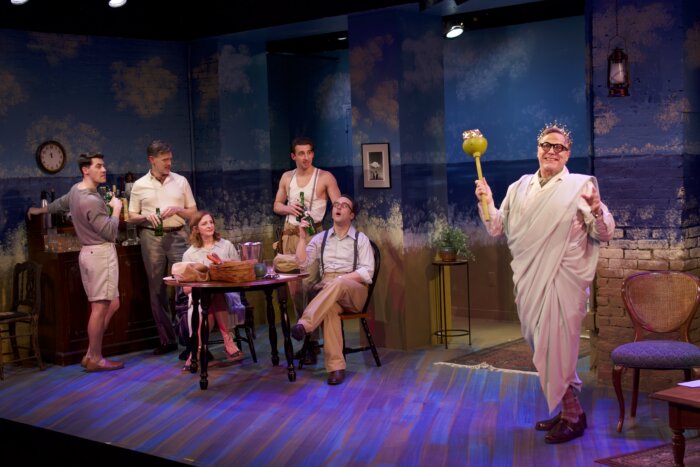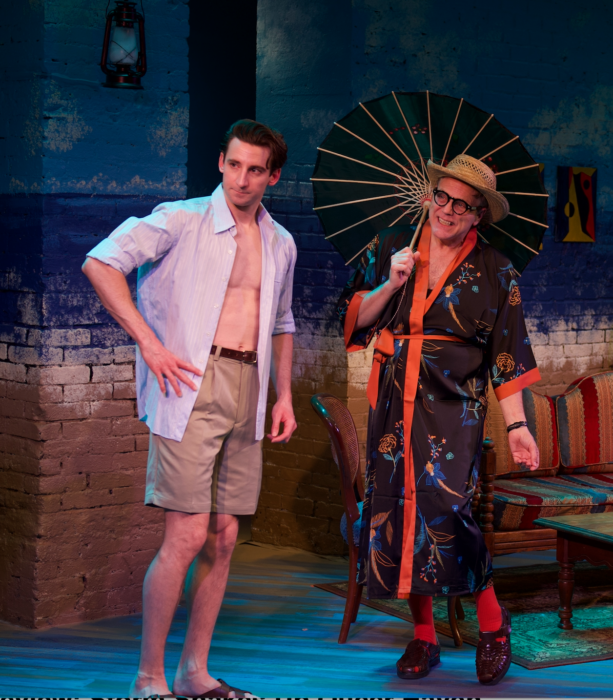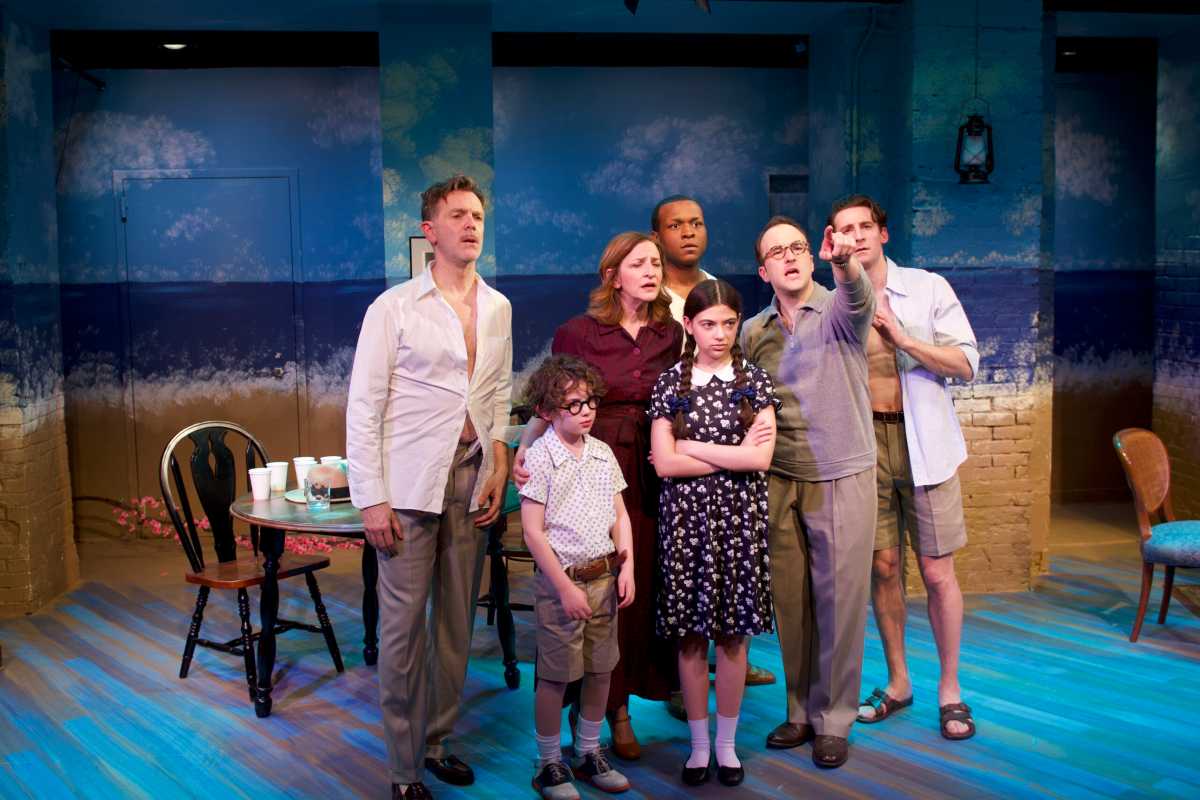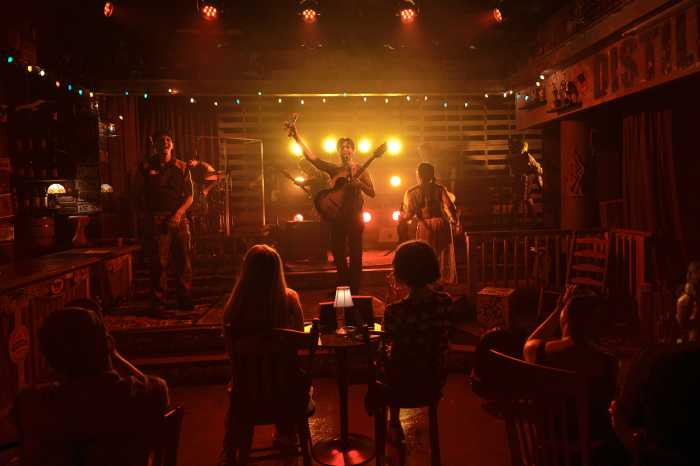A few years back, the New-York Historical Society hosted an eye-opening exhibition of photos and ephemera from the Cherry Grove Archives Collection. Titled “Safe/Haven,” it offered a rare glimpse of the secluded Fire Island enclave circa 1950s, when LGBTQ folks took refuge, far from the bustle of New York City. It was (and still is) a relatively safe space to explore their identity.
The exhibit featured black-and-white images of smiling queer men and women cavorting on the beach, camping at parties, and hamming it up at the community theater. Back then, the houses were little more than rickety beach shacks, often with no electricity or indoor plumbing. While the exhibit was thought-provoking, it begged the question, “What was life actually like for these intrepid outliers?”
The TOSOS Theater Company has gamely attempted to shine a light on this era with “Pride House,” a dramedy set in Cherry Grove. The time period has shifted to 1938, when a fierce, surprise hurricane blasted through New York’s Long Island and Fire Island, and on to New England, killing hundreds of people.
Playwright Chris Weikel leverages the calamity as a somewhat hackneyed yet apt metaphor for the parallel storm brewing between the gay folks and certain conservative, straight, “family-oriented” homeowners, who don’t take too kindly to the same-sex shenanigans perpetrated by the artistic crowd, often referred to as “pouffs.”
In the program notes, Weikel states that while the work is loosely drawn from real events (some characters were inspired by and named after residents at the time), the drama is a work of fiction, with intentional anachronisms. For example, someone refers to “exploits in the Meat Rack,” though that term was not used until decades later.

Under the direction of Igor Goldin, “Pride House,” now playing at the Flea Theater, pulses with wit and charm. Clocking in at two-and-one-half hours including intermission, however, the pacing is uneven and the script could use some nips and tucks. The large ensemble of a baker’s dozen of exuberant cast members is highly engaging, albeit unwieldy at times.
The action centers around moneyed socialite Beatrice (an exceptional Jamie Heinlein) and her ex-husband Thomas (Patrick Porter), who still live together despite his overt dalliances with other men. Although she is straight, she is what today we’d call an “ally,” regularly hosting LGBTQ people at her ample beach cottage and fighting for their rights in the face of staunch opposition from bigoted busybodies Irene (a delightfully droll Gail Dennison) and her husband George (Desmond Dutcher).

Beatrice and Thomas are throwing an end-of-season bash at their house, unaware that a hurricane will hit that night. Few people had access to radios, and forecasters predicted the storm would make landfall further down the coast. Luckily they have the harbor master (Dontonio Demarco) on hand to help things go smoothly.
Houseguests include Arthur (Tom Souhrada), a flamboyant “queen” who insists on wearing glamorous costumes and stealing the spotlight; John (Aaron Kaplan), a semi-closeted writer for the New Yorker magazine; Edwin (London Carlisle), a handsome, famous dancer; Natalia (Jessica Disalvo), a Broadway star embarking on a lesbian love affair; and a pair of gorgeous chorus boys (Alex Herrera and Jake Mendes).
Not that their existence is all negronis and bon mots. Weikel is not afraid to portray the darker realities of the era, where racism found its way to the remote retreat. George blithely orders a drink from Edwin simply because he is Black, not realizing he is an invited guest. Arthur hurls a racial slur at Edwin so heinous that some audience members gasped. Edwin rightfully retaliates and regains his dignity, but just barely.
Kudos to Evan Frank, who has designed an efficient set of a homey beach house interior juxtaposed with a glorious seascape mural. It’s so beautiful he can be forgiven for including a cherry tree branch in full bloom, despite it being September. The fully equipped bar, overloaded with liquor and wine, gets so much attention throughout the proceedings it practically registers as a separate character.
History has shown that the infamous hurricane not only altered the topography of Fire Island, but also reshaped its cultural history. Weikel sees the event as “an inflection point for the creation of the queer community that still exists on the island today.”
Remarkably, TOSOS (“The Other Side of Silence”) was founded 50 years ago by a pioneering playwright and gay rights activist, Doric Wilson, and this full-hearted production is a fitting tribute. According to Beatrice, she named her cottage “Pride House” as a nod to Jane Austen’s “Pride and Prejudice,” though these days, it carries a much larger meaning, signifying LGBTQ rights. And if you visit Cherry Grove today, you will indeed find there is a cottage bearing that name.
“Pride House” | TOSOS Theater Company | The Flea Theater | 20 Thomas St. (TriBeCa) | $40 | Through February 10, 2024 | Tososnyc.org/pride-house | 2 hours, 30 min. with 1 intermission


































